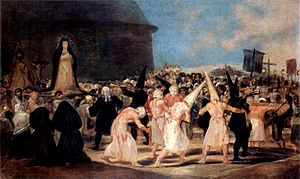A Procession of Flagellants facts for kids
Quick facts for kids A Procession of Flagellants |
|
|---|---|
| Spanish: Procesión de disciplinantes | |
 |
|
| Artist | Francisco de Goya |
| Year | 1812–1819 |
| Medium | Oil on panel |
| Dimensions | 46 cm × 73 cm (18 in × 29 in) |
| Location | Real Academia de Bellas Artes de San Fernando, Madrid |
A Procession of Flagellants (also called Procesión de disciplinantes) is a famous painting by Francisco de Goya. He painted it between 1812 and 1819. It shows a group of people taking part in a religious procession.
In the front of the painting, you can see Roman Catholic men. They are dressed in white and wear tall, pointed hats. They are showing their strong devotion by whipping their backs. Some of their backs are bleeding. They are also pulling very large statues. These statues include Nuestra Señora dela Soledad, the Ecce Homo, and a statue of the Crucifixion of Christ. Other people are kneeling along the path, wearing black hoods. Some are carrying banners, crosses, and lamps.
Contents
What is This Painting About?
This painting is part of a group of artworks by Goya. Other paintings in this series include The Inquisition Tribunal, The Madhouse, and The Bullfight. These paintings show different parts of Spanish life during Goya's time.
Goya's Views on Spain
Goya was a "liberal" at this time. This means he wanted to see changes and improvements in Spain. However, King Ferdinand VII of Spain had an "absolutist policy." This meant the king had all the power and did not want many changes. Goya's paintings often showed things that he believed needed to be reformed. They often showed the difficult or harsh parts of life in Spain.
Light, Dark, and Meaning
A common feature in these paintings is the use of light and dark. In A Procession of Flagellants, the people in the front are brightly lit. You can see their faces and details clearly. The background, however, is darker and shows a large, anonymous crowd. They are dimly lit under a cloudy blue sky. A dark wall separates these two areas. This wall might represent the strong influence of religion at the time.
Spain's Image in Art
This series of paintings helped create a certain idea about Spain. It was sometimes called the 'Black Spain' legend. These artworks showed Spain as an interesting and sometimes mysterious place to other Europeans. This interest grew after the French came into contact with Spain during the Peninsular War. Paintings like this, with their dramatic and powerful feeling, inspired many other artists later on.
See also
 In Spanish: Procesión de disciplinantes para niños
In Spanish: Procesión de disciplinantes para niños
- List of works by Francisco Goya
 | Selma Burke |
 | Pauline Powell Burns |
 | Frederick J. Brown |
 | Robert Blackburn |

